Celebrating a century of racing pigeons
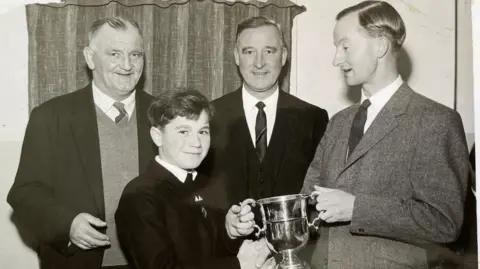 Handout
HandoutFounded in 1924, Paulton Homing Society in Somerset has been sending off and welcoming home pigeons for 100 years. For many members it is a hobby that has taken over their lives. Now they have been reminiscing on how the sport has changed over a century.
Barrie Simmons' father, Harry, was one of the society's 12 founding members and completed 60 years as its secretary.
"He was 'Mr Paulton Homing Society'," Barrie said.
"Things were very much different in those days... I was brought up when it was an out-and-out hobby, but with commercialisation comes changes."
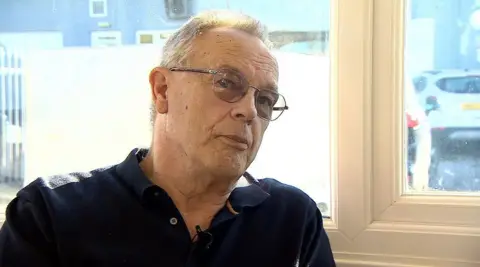
Pigeon racing - in which the birds return to their homes over a carefully-measured distance - is thought to have begun as a sport in Belgium before becoming popular with working-class communities in the UK.
In north east Somerset, it was the old coal miners who kept the hobby alive.
Thinking about the "good old days", Barrie said that when the pigeon arrived back at its loft, the rubber ring was removed and handed to the fastest boy from the local school who would run it to the post office for an official time to be recorded.
The boy would be paid sixpence for his efforts.
Now, the sport sees high-tech devices and the use of ETF (Electronic Timing Systems) systems.
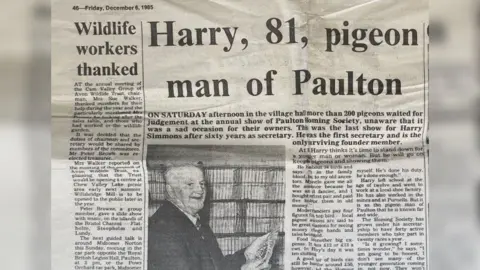
Peter Rakes has been flying pigeons since 1952, when he was just a boy.
He lived in Townsend, not far from Paulton, and said in his youth there were 20 pigeon fanciers in the area.
"It was the coal miners who kept the sport going. It was their bit of fun," he said.
"They used to take the pigeons on the train up to Bristol to be released."
And on the way back there would be the treat of fish and chips in Brislington, he added.
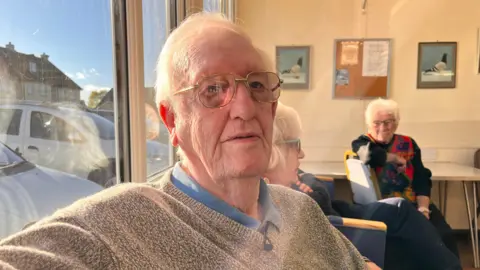
Apart from when he got married and did not fly for a couple of years, Peter said "pigeons have been my life".
"It is in my family, my father was a pigeon fancier [breeding the birds]," he said.
"I've been retired a few years now. If I didn't have my pigeons it would drive me up the wall."
He said he will eventually "pack in pigeons" on the day he loses a sense of pride when he sees his birds come home.
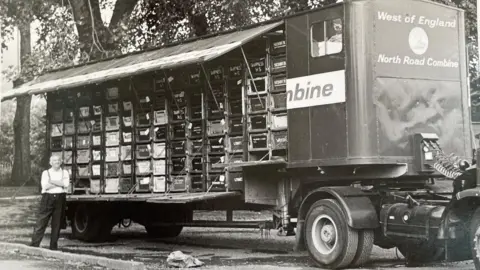 Handout
HandoutBarries said as the years had gone by, the sport had become commercialised.
"Even when my father retired in 1985, he remarked then it was becoming commercialised," he said. "There is a lot of money involved in it now."
And with that, comes even more competitiveness.
Largely gone are the days when a fancier would take a young boy - or older gentleman - under their wing and pass on their knowledge of the sport, and potentially even give them a bird to get started.
"Nowadays, yes there are still some genuine fanciers about, but there is a lot of money that changes hands regarding young pigeons - even old pigeons - and I am talking about hundreds and thousands of pounds," Barrie said.

Geoff Cooper has had some success with racing.
He loves the international races which can take place across Europe and see the birds flying anywhere up to 800 miles back to their lofts.
"I have won a lot of short and middle-distance races," Geoff said.
But asking him how that feels, he said his reply would "have him in tears".
"Those winners… I can remember every pigeon that I have timed late at night into the day and I've been racing since 13 and keeping them since 11," he said.
"My life - wasted on pigeons," he joked.
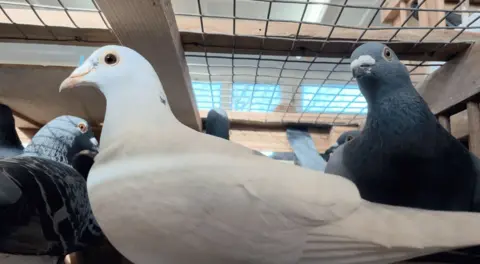
Barrie added: "It is a fascinating sport. I've been sat on the wall at West Bay with baskets of pigeons ready to let go and people have been interested.
"You try to explain to them about how they are going to be let go and make their way back to their loft, and they will do that on a Saturday from various race points from 50 to 800 miles [away].
"They become absolutely fascinated with it. It is that sort of sport. It is like a drug, it gets a hook into you.
"I just love the sport, to sit in the garden and wait for those birds. The words that most fanciers will say is 'here's one'. It is phenomenal."
And so 100 years on from when the society first started, for these men at least, there is no sign of slowing down or taking a step back, just yet.
